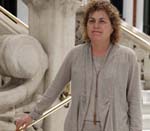Teresa Palahí has been a trustee of Eyes of the world for almost two years. She joined the organization at the end of 2009 as a representative for the ONCE Foundation for Latin America, replacing the director general, Fernando Iglesisas. Since the beginning, her professional career has been linked to the Spanish National Association of the Blind, where she was a territorial delegate from 2000 until April 2009, when she was appointed as Second Vice President at the Spanish level. Blind since adolescence due to macular degeneration, she is aware of the complications that visual impairment causes in people’s lives, and even more so in countries without financial resources.
After your time on the Board of Trustees, what do you think about the work of the foundation?
Very positively, since in these past few years I have been able to live up close to the magnificent work that Eyes of the world carries out, whether at the level of health care, as it is concerned with training, prevention or resources.
What does it mean to be blind in poor countries in comparison to ours?
Among other things, it means not having an organization like the one we have in Spain, in Catalonia: the ONCE. It therefore represents having to live with many deficiencies, without opportunities and limited by the inability of the country to integrate the most vulnerable.
How do you think these problems should be confronted by the international community? Are they confronting it sufficiently?
A good way to act in order to improve the situation is to cooperate with NGOs that work in different fields, like Eyes of the world. It works well but it is never enough, since there are countless deficiencies.
Is it possible to have an organization similar to ONCE in the most disadvantaged territories?
It is very difficult, since in these countries they cannot rely on a singular organization, like ONCE, because the necessary conditions are not given.
Is society really involved in these issues or is more awareness needed?
We have made progress in this aspect in the past few years, but there is still a long way to go in terms of raising the awareness of society, which should help us to put forward projects that can effectively respond to the needs of this population.
Would you like to say anything to the people that are reading this interview?
Yes. I want to transmit a message of hope and excitement because if we all become aware of this issue and stand in solidarity with people who have fewer resources, I am convinced that a better world is possible.
